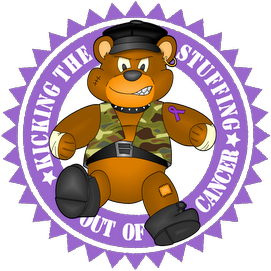I found this at another site and I feel that it is a wonderful thing to share;
Sometimes you feel other people's pain worse than your own. We're armored against our own troubles. We can't afford to give in to despair. Then you see someone else struggling, and it breaks your... heart.
Sean Stewart, Perfect Circle, 2004
What do you say when you learn that someone you care about has cancer? What do you do? Is there any “right” way or “wrong” way to
respond to the news?
Most cancer survivors we’ve talked with have stories to tell of comments and gestures made by friends and family members, some of which were hurtful and some of which were helpful. Based on those survivors’ stories as well as our own experiences, we offer the following "do's" and “don’t’s”. First the "don't's":
1. The worst thing you can say or do is to say or do nothing at all. Almost every survivor we’ve ever spoken with can tell of at least one person who, upon hearing the news, disappeared and was never heard from again. Maybe the fact that your friend or loved one has cancer is the worst news you’ve ever heard and you can’t stand the thought of him being this sick. You don’t know what to say or do, and it’s too painful to see him without hair, and the house smells like a hospital, and, well, it’s all so just so scary. We don’t mean to be harsh here, but this really isn’t about you. Stick around, please. Your loving presence alone can be the healing salve for a wounded, frightened spirit.
2. We know you mean well when you say, “God won’t give you more than you can handle,” but we wish you would listen to the implications in that comment and refrain from using it. It implies that God gave us cancer which inference often leads newly diagnosed patients to wonder if God is punishing them for something they did or failed to do, and that's the last thing we need to be worrying about right now.
To clean up a popular phrase, stuff happens. People get cancer (1 in 3, in fact). People get lots of other awful diseases, too. Babies are born with defects. Long-distance runners have heart attacks. Brave men and women go to war and get killed. Supermen fall from horses, and maniacs fly airplanes into buildings. And, yes, many people do get more than they can handle as evidenced by suicide rates. We don’t mean to step on anyone’s religion here, but we refuse to believe God is the one causing all this
mayhem, destruction and chaos.
Conversely, we believe God grieves with us when these things happen, and He is there for us and with us in the treatment room, in the delivery room, on the racecourse, on the battlefield, in the emergency room, on the airplane and inside its target. Instead of telling us that God gave us cancer, tell us that God will be with us
every step of the way.
3. Don’t predict the future. Acknowledge the seriousness of the diagnosis without being morbid (Oh, my God! My aunt had the very same thing and she died 8 months later!”) and without being unrealistic (“You’ll probably outlive me. I could get hit by a bus tomorrow!”). We don’t know what’s going to happen to us, and neither do you. Tell us happy stories of other long-term cancer survivors (but refrain from saying someone had “the very same thing”; no two cancer diagnoses are ever the same).
Never, ever tell us stories with unhappy endings.
Now for the “do’s”:
1.Things to say: “I’m here for you.” “You can cry with me.” “I love you.” “I won’t leave you.” “Whatever you’re feeling is okay.”
Just be there. Follow our lead. We’ll let you know if we want to “talk about it,” and if we do, please let us. Don’t change the subject. When you don’t allow us to talk about our disease, it makes us feel alone and isolated.
2.Things to do: Take my kids out for pizza and a movie or, better yet, for the weekend. Offer to pick up prescriptions, take the dog to the groomer and run other errands. Clip cartoons and funny pictures and send them in a card. Bring thoughtful gifts (a book or magazine, a tabletop fountain, a meditation tape or CD); avoid things with strong smells (bath sets, flowers, food, etc.) until you know how I'm reacting to my treatments.
A special message for doctors and other medical professionals: We know there are no guarantees, but you can give us hope. Your patients ask you for hope in different ways. Some are subtle, and some are screaming. Remember that where there is life, there is hope, and remind us of that. Instead of just saying, “You have cancer, and it’s very serious,” say, “You have cancer. It’s very serious, but once you get past the shock of this diagnosis, you are going to discover what a strong, resilient person you are. That strength and resilience partnered with our staff’s knowledge, skill and experience are going to form a powerful team to fight this disease. We’re going to do this together.”
Subscribe to:
Post Comments (Atom)



1 comment:
I started on COPD Herbal treatment from Ultimate Life Clinic, the treatment worked incredibly for my lungs condition. I used the herbal treatment for almost 4 months, it reversed my COPD. My severe shortness of breath, dry cough, chest tightness gradually disappeared. Reach Ultimate Life Clinic via their website at www.ultimatelifeclinic.com . I can breath much better and It feels comfortable!
Post a Comment